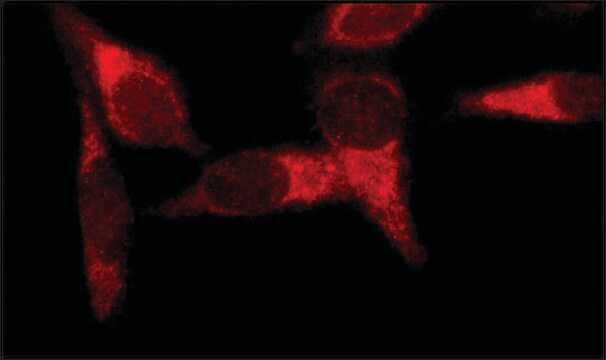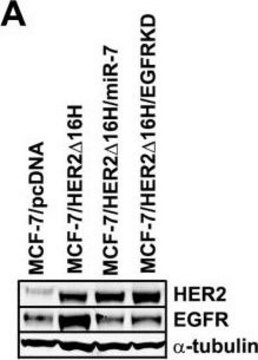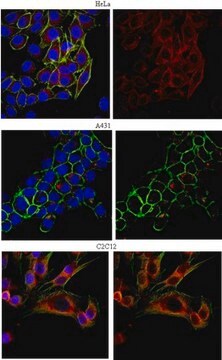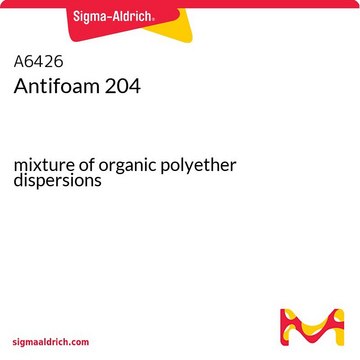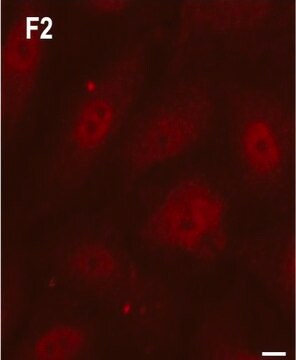추천 제품
생물학적 소스
mouse
Quality Level
결합
unconjugated
항체 형태
purified from hybridoma cell culture
항체 생산 유형
primary antibodies
클론
EEA1-N19, monoclonal
형태
buffered aqueous solution
분자량
antigen ~160 kDa
종 반응성
human, mouse, rat
농도
~1.0 mg/mL
기술
immunoprecipitation (IP): suitable
indirect immunofluorescence: suitable
western blot: 1-2 μg/mL using whole extract of rat NRK cells
동형
IgG2a
UniProt 수납 번호
배송 상태
dry ice
저장 온도
−20°C
타겟 번역 후 변형
unmodified
유전자 정보
human ... EEA1(8411)
mouse ... Eea1(216238)
rat ... Eea1(314764)
일반 설명
Monoclonal Anti-EEA1 (mouse IgG2a isotype) is derived from the hybridoma EEA1-N19 produced by the fusion of mouse myeloma cells and splenocytes from BALB/c mice immunized with a synthetic peptide corresponding to a fragment of human EEA1. Early Endosome Antigen 1 (EEA1) is a dimer. It comprises extensive coiled-coil regions, and at its C-terminus contains a cysteine-rich zinc-finger-like domain named FYVE domain.
The gene Early Endosome Antigen 1 (EEA1) encodes for around 1400 amino acid proteins. It is a peripheral membrane protein associated with the cytoplasmic face of early endosomes. EEA1 is a autoantigen associated with subacute cutaneous systemic lupus erythematosus and is a coiled-coil protein localized to early endosomes and cytosol.
애플리케이션
Anti-EEA1 antibody, Mouse monoclonalhas been used in:
- immunoblotting
- immunoprecipitation
- cell fractionation
- indirect immunofluorescence
- immunohistochemistry
Monoclonal Anti-EEA1 antibody produced in mouse is suitable for the following applications:
- Immunoprecipitation
- Indirect immunofluorescence
- Western blotting at a concentration of 1-2μg/mL using whole extract of rat NRK cells
생화학적/생리학적 작용
Early Endosome Antigen 1 (EEA1) FYVE domain is involved in intracellular trafficking and is implicated in the specific localization of EEA1 to endosomes . Endosomal targeting of EEA1 also requires its binding to the active form of the small GTPase Rabaptin-5 (Rab5). The binding of EEA1 to phosphatidylinositol 3-phosphate (PtdIns 3P) and Rab5-GTP is essential for the localization and function of EEA1 in endocytic membrane fusion. Monoclonal Anti-EEA1 may be used as an early endosome marker.
Early Endosome Antigen 1 (EEA1) controls vesicle fusion during endocytosis. In neurons, it is involved in recycling of synaptic vesicles and neurotransmitter receptors. Patients with neurological deficits develop EEA1 autoantibodies. Mutation in EEA1 gene leads to susceptibility to diabetes in the Japanese population. Phosphatidylinositol 3-phosphate (PtdIns(3)P) is essential for the localization and function of EEA1.
물리적 형태
Solution in 0.01 M phosphate buffered saline, pH 7.4, containing 15 mM sodium azide.
면책조항
Unless otherwise stated in our catalog or other company documentation accompanying the product(s), our products are intended for research use only and are not to be used for any other purpose, which includes but is not limited to, unauthorized commercial uses, in vitro diagnostic uses, ex vivo or in vivo therapeutic uses or any type of consumption or application to humans or animals.
Not finding the right product?
Try our 제품 선택기 도구.
Storage Class Code
12 - Non Combustible Liquids
WGK
nwg
Flash Point (°F)
Not applicable
Flash Point (°C)
Not applicable
시험 성적서(COA)
제품의 로트/배치 번호를 입력하여 시험 성적서(COA)을 검색하십시오. 로트 및 배치 번호는 제품 라벨에 있는 ‘로트’ 또는 ‘배치’라는 용어 뒤에서 찾을 수 있습니다.
Cellular functions of phosphatidylinositol 3-phosphate and FYVE domain proteins
GILLOOLY DJ, et al.
The Biochemical Journal, 355, 249-258 (2001)
Sequential roles for phosphatidylinositol 3-phosphate and Rab5 in tethering and fusion of early endosomes via their interaction with EEA1
Lawe DC, et al.
The Journal of Biological Chemistry, 277(10), 8611-8617 (2002)
Timely regulated sorting from early to late endosomes is required to maintain cerebellar long-term depression
Kim T, et al.
Nature Communications, 8(1), 401-401 (2017)
Biogenesis of the sorting endosome: the role of Rab5
Woodman PG
Traffic, 1(9), 695-701 (2000)
Aline Raquel Voltan et al.
Medical mycology, 51(7), 759-764 (2013-04-10)
Paracoccidioidomycosis (PCM) is a chronic granulomatous disease caused by the dimorphic fungus Paracoccidioides brasiliensis, endemic in Latin America. P. brasiliensis has been observed in epithelial cells in vivo and in vitro, as well as within the macrophages. The identification of
자사의 과학자팀은 생명 과학, 재료 과학, 화학 합성, 크로마토그래피, 분석 및 기타 많은 영역을 포함한 모든 과학 분야에 경험이 있습니다..
고객지원팀으로 연락바랍니다.